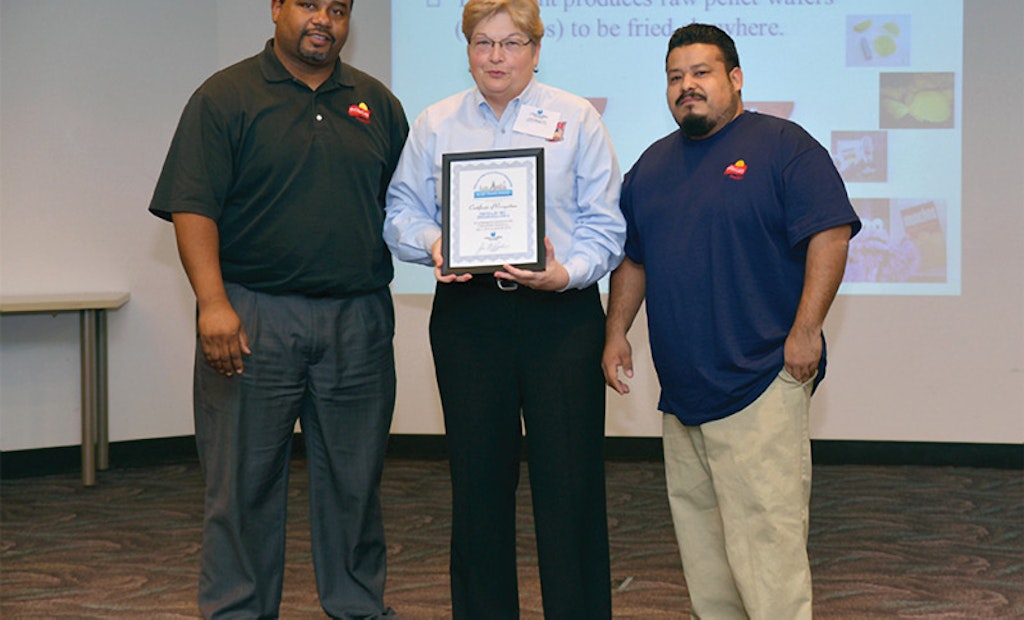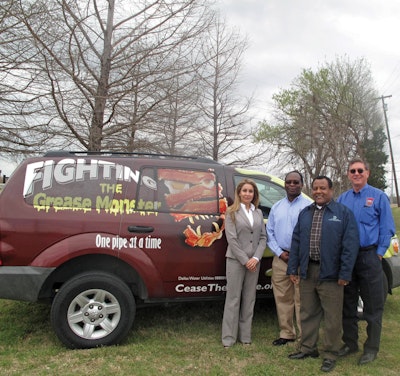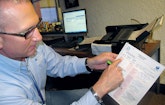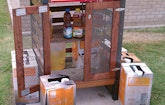
Interested in Cleaning?
Get Cleaning articles, news and videos right in your inbox! Sign up now.
Cleaning + Get AlertsIn a major metropolitan area with close to 6,000 restaurants, one of the major challenges for the Pretreatment and Laboratory Services Division of Dallas Water Utilities is keeping the city’s wastewater collection system clear of FOG and flowing freely.
Senior Program Manager Morgan Dadgostar, P.E., says that tracking compliance with the city’s requirements for keeping fats, oils and grease out of the collection system became more manageable about five years ago when her division acquired a program from XC2 Software to monitor private liquid waste haulers who collect and dispose of waste from the grease and grit traps at restaurants.
As DWU employees worked with XC2 on the system to track waste, it became apparent the data collected by the software could also be used to track restaurants’ compliance with city regulations governing the maintenance of grease traps.
Dadgostar says the need for the liquid waste manifest system arose from a growing concern that some haulers were improperly disposing of loads. Although Texas and local regulations require that haulers take their loads to state-licensed disposal facilities, DWU had no system for tracking the final destination of grease, grit, portable toilet waste, septic tank waste, oil and “other” liquid wastes. Only septage from portable toilets and septic tanks is dumped at DWU treatment plants; the rest of the liquids are taken to private disposal businesses.
“We had noticed that the grease would get picked up, but then there would be no evidence of where it went. So we came up with software that would follow it from cradle to grave,” Dadgostar says.
And once the manifest software was ready, DWU worked with a second vendor, Scantron, to develop a form that automatically records the manifest data from the haulers into DWU’s system. Scanning greatly reduces the time required to upload the data and helps organize the information in a searchable database complete with images of the original manifests.
That way, the XC2 software can be used to track individual restaurants’ compliance with Dallas regulations, which require a cleanout at least once every 90 days, and can also determine whether a restaurant needs more frequent cleaning of its grease trap. Field inspectors in the liquid waste operation are able to access the compliance data from the field or in the office at the end of a shift as they enter their reports and plan their next shift.
Manifest destiny
The manifests, which have been in use for three years, are a five-part form with three sections to be completed at each step of grease disposal. Each section has “bubble” boxes where businesses record basic data as well as a box where a representative signs off on the date and time of the transaction. In the first section, the waste generator is required to describe the waste being picked up and the capacity of their trap or fixture. In the second section, the transporter reports the volume of the material removed, and in the third section, the licensed disposal site reports the volume disposed.
“We made sure that we touch all the different components of tracking compliance with our regulations for grease,” Dadgostar says. “That way, if we can see a problem in our records, we can go to a restaurant, a waste hauler or a disposal site and look into it more closely.”
All liquid waste haulers operating in the city are required to have a city permit as well as appropriate state permits. All vehicles used for transporting liquid must be annually inspected and approved by DWU inspectors. City codes require waste transporters to use the manifest system (DWU sells books of 25 manifests for $10) and it is the responsibility of a transporter to insure that all manifests are properly completed and turned in to the utility by the 10th day of each month.
Although the forms are simple to fill in, they provide all the data DWU needs to track liquid waste disposal. Richard Statser, DWU’s liquid waste section supervisor, says waste haulers sometimes grumble about the added paperwork, but most of the businesses are satisfied with the simplicity of the process and many of them recognize the added business it can bring them. “If a restaurant wasn’t having its drains cleaned every 90 days before we started tracking this data, now they are probably going to comply. That means more business for the waste haulers.”
A good model
Statser says the data recorded with the software helps the division make better use of the five field inspectors, one scanner operator/inspector and one supervisor assigned to overseeing the food service operators.
The DWU system for tracking the transportation and disposal of grease has attracted attention from other communities and the division is often asked to provide speakers for a variety of meetings and gatherings attended by wastewater utility officials.
The liquid waste-tracking software has been in use for about three years and Statser says it has made a big difference in compliance by the city’s restaurants.
In the normal cycle of checking the thousands of grease and grit traps in use across Dallas, Statser says an inspector can be expected to visit a restaurant once every three years. But if there are problems with FOG blockages in a sewer line or if a waste hauler reports possible problems at a restaurant, an inspector can be dispatched to assess the situation. And if records show that a restaurant is not meeting minimum requirements for having its grease and grit pumped out, an inspector can see that in the data and pay a visit right away.
Dadgostar says the city is more interested in fostering compliance than issuing citations, and she has found that even when a restaurant is having a problem with grease getting into the sewers, owners are often open to advice and assistance in correcting the problem. “We think that people really understand and care about the impact they have on the system and on the environment,” she says.
Education and compliance
DWU’s inspectors are trained to focus on educating owners and managers when they find problems with a restaurant’s records. Those restaurants are targeted first for regular inspections, Dadgostar says. “Before we had this software, we were operating kind of blind.”
The DWU website lists a variety of factors that determine the action that could be taken if the city finds a customer in violation of codes governing liquid waste disposal. These factors include:
- The magnitude and duration of the violation
- Any effect on the Publicly Owned Treatment Works (POTW) or the Trinity River
- Any injury to personnel or the public
- The compliance history of the business
- Any good faith demonstrated by the offender
But the pre-treatment program is even more proactive than that. DWU employees spend a lot of time in the community attending local restaurant expos and other gatherings of restaurant owners and employees to speak about the need and the ways to keep FOG out of the wastewater collection system. Dadgostar says the time invested in those efforts is much less costly than the time and the resources needed to remove a major blockage in the city’s sewer system.
Cease the Grease
Restaurants might be DWU’s largest individual source of FOG, but in a system that serves more than 2.4 million people the greatest threat to the wastewater collection system might be the grease that comes from residential sources. Because of that, the utility has stepped up its attention to public education about the problems their kitchen wastes could cause in the city’s sewers.
In 2005, a year when its crews were called out 112 times to clear FOG-based blockages in the wastewater lines serving Dallas and several suburbs, DWU launched its Cease the Grease program aimed at educating the public about the need to keep fats, oils and grease out of the sewers. In the fiscal year that ended Sept. 30, the utility recorded only four such events, a 96 percent reduction.
Cease the Grease coordinator Helen Cantril Dulac says the evolving program tackles the problem with a multi-faceted approach that focuses on everything from the costs and conveniences that adults might be most concerned about to the environmental concerns that might attract the attention of the region’s students. Dulac visits up to 200 classrooms per year to speak about the importance of keeping FOGs out of the wastewater system and part of her pitch is to tell students how the wastes can be used as an alternative, environmentally friendly fuel source.
Relying on characters ranging from Earl the Plumber, who stands ready to send them a hefty bill for cleaning their FOG-clogged lines, to Perry the Pipe whose video (www2.dallascityhall.com/cease/ceasethegrease.html) gives students a first-hand look at the problems that household grease can cause, the Cease the Grease program focuses on the simplest preventive measures people can take to avoid those problems. And the program goes beyond just education. DWU offers a variety of ways to help people keep FOG out of the collection system.
One of the most visible measures is a growing network of oil disposal stations deployed around the metropolitan area. There are 20 current locations with cabinets where Dallas residents can dispose of cooking oil and grease. Some of the collection points are at partner businesses like four Whole Foods supermarkets while others are at conspicuous curbside locations. Dulac says that when the stations were first set up, the city collected about 300 to 400 gallons per year. Now, it is more like 400 gallons per month. The disposed oil was once donated to a local school bus operation to use as bio-fuel, but the city now takes it to its own digester at the DWU Southside Treatment Plant where it is converted into methane to fuel a generator that helps power the plant.
Dulac says DWU employees have found everything from 5-gallon jugs of used cooking oil to little containers the size of baby food jars at the collection sites. Some of the oil might also arrive in some of the containers that DWU employees distribute when they are staffing displays at a variety of community events in all corners of the city.
From large plastic jugs and zip-top foil pouches for collecting household FOG to funnels that help people avoid spills while filling the containers, Cease the Grease envoys try to make it as easy as possible for people to avoid dumping their oils down the drain. In addition to the 20 collection stations, DWU employees also distribute information about other sites that collect household oils and fats for recycling. But Dulac says she and her colleagues also tell people that if they can’t recycle, it is still better to contain the oils and put them in the garbage rather than pour them down the drain.
Dadgostar oversees a staff of 52 people in DWU’s Pretreatment and Laboratory Services Division. About half of the employees work in the three labs operated by the wastewater operation while the rest work in the pretreatment programs.
Two labs are located at DWU’s two wastewater treatment plants — the Southside and Central plants — where the employees perform process analysis and final discharge analysis to ensure the facilities are performing properly. The third lab is primarily working on the analysis of samples taken from industrial customers subject to pretreatment regulations.








